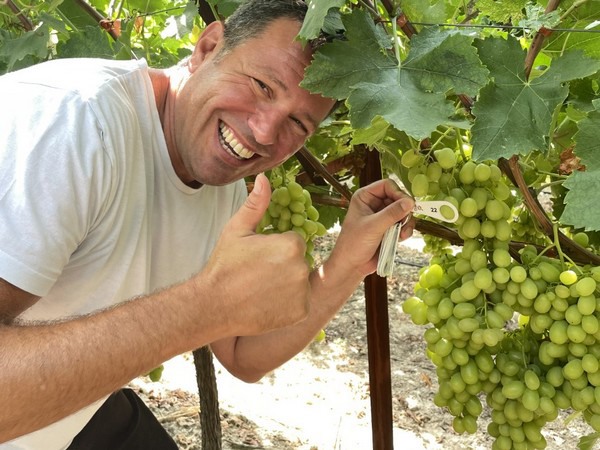There were high hopes for the Greek grape season of 2022, but George Saliaris-Fasseas, founder of Greek Grape Company, states it all turned ugly in September, thanks to the weather: “Before the grape season started, we were extremely enthusiastic. Greek Grape Company grows IFG varieties and we were excited by the bunch formations and size of the fruit which averaged 19mm and exceeded 23mm in some varieties. Our UK retail customers were anticipating our fruit and it was the first year that we could supply them with IFG Sweet Favors in the black seedless category. However, this all changes when September came around the corner. For the first time in 75 years, ever since we’ve had weather data available, our farms had extreme relative humidity.”
“Our farms are located in a special area that has what locals call "Vardaris", a North West wind that dries the atmosphere. Hence, Agios Pavlos in Halkidiki has always been a traditional grape growing area. But this year for 28 consecutive days, we had extreme relative humidity. As a result, the grapes didn’t finish perfectly and required fast sales. Combined with a heavy rainfall, which completely wiped out our IFG Sweet Globe and damaged the IFG Sweet Favors, the season turned out to be a bad one.”

George Saliaris-Fasseas was positive at the start of the season
Greece wasn’t the only producing country with issues, as Spain also had to deal with a heatwave. Saliaris-Fasseas feels that maybe it would have been better to focus on the Greek local market, if profits would have been the most important factor for the company: “Red Seedless was in extremely high demand, as Spanish grapes didn’t have the desired colour and finishing due to their heatwave. We kept our prices low, in order to assist our clients with their inflationary problems and moved our fruit fast. In hindsight, we could’ve done things differently. We should have installed air conditioning in the fields, but with the rising energy prices, thank God we didn't! Joking apart, we should have sifted more fruit in the Greek market, but did not want to lose our long standing programs with our UK customers. The financial results would have been much better as the costs are lower for both transport and packaging, and the Greek market always wants great eating crunchy grapes.”
As expected after the humidity problems, the season ended early for the Greek grape exporter, Saliaris-Fasseas explains. “The demand for Greek grapes was down 20-30%, as customers are more selective with their spending and Spain has a lot to offer and great relationships with the retailers. The UK market is very big for Greek Grape Company, but has contracted other Greek exporters as well. Germany remains the key market for Greek Seedless grapes. We planned from the beginning to finish this season early and we finished sales in the first week of October. Usually, we would finish mid-November, but we communicated the relative humidity situation we faced with our customers in September and adjusted our programs accordingly.”
Greek Grape Company is not about to give up though, as Saliaris-Fasseas expects to be back in a strong capacity next season: “For next year, we’re proceeding with our planting program as we are planting a special grape variety this year, which the market really needs. If we were going to plant non-niche varieties, I would have postponed new plantings as the financial results were not good. This weather is the new normal and this gives an extra reason for retailers to plan for Greece, as it gives them options to fill their shelves in this climate changing world that we have created.”
For more information:
George Saliaris-Fasseas
Greek Grape Company
Email: [email protected]
www.ggc.gr
